Business
Concerns mount as inflation rate jumps to 13.71 per cent
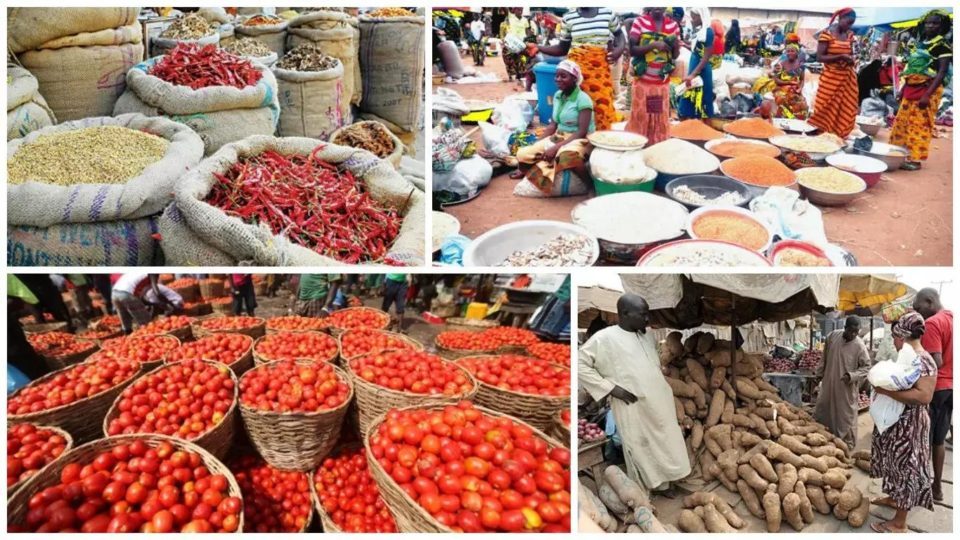
There are fears that the Nigerians’ living conditions may not fare better in the coming months following the continued rise in inflation rate. The inflation rate rose to 13.71 per cent in September, which is 0.49 per cent higher than 13.22 per cent recorded in August 2020.
The latest inflation figure was released on Thursday by the National Bureau of Statistics in its Consumer Price Index report.
The rate has been on a steady rise this year. For instance, the inflation rate stood at 12.82 per cent in July, compared to 12.56 per cent in June 2020.
The September figure is noted as the highest level since March 2018 when it hit a record high of 13.34 per cent.
According to the NBS new report, “The consumer price index which measures inflation increased by 13.71 per cent (year-on-year) in September 2020. This is 0.49 per cent points higher than the rate recorded in August 2020 (13.22) per cent.”
Details of the report showed that increases were recorded in all COICOP divisions that yielded the headline index.
On a month-on-month basis, the headline index increased by 1.48 per cent in September 2020, which is 0.14 higher than the August 2020 (1.34) figure.
The percentage change in the average composite CPI for the 12-month period, ending September 2020 over the average of the CPI for the previous 12-month period is 12.44 per cent, showing 0.21 percentage point from 12.23 in August 2020.
The urban inflation rate increased by 14.31 per cent (year-on-year) from 13.83 per cent recorded in August 2020, while the rural inflation rate increased by 13.14 per cent from 12.65 in August 2020.
The urban index rose by 1.56 per cent in September 2020, on a month-on-month basis. This was up by 0.14 from 1.42 per cent in August 2020.
The rural index also rose by 1.40 per cent in September 2020, up by 0.13 from 1.27 in August 2020.
The corresponding 12-month year-on-year average percentage change for the urban index is 13.07 per cent in September 2020.
This is higher than the 12.85 per cent in August 2020, while the corresponding rural inflation rate in September 2020 is 11.86 per cent compared to the 11.66 per cent of August 2020.
The Lagos Chamber of Commerce and Industry has expressed worry at the continued uptrend in headline inflation and urged the government to address issues around the disruption of agriculture value chain including insecurity problem.
Its President, Mrs Toki Mabogunje, said at a recent press briefing on the state of the economy that intense inflationary pressures would exert negative impact on households purchasing power, investment, production cost and business operations.
She noted the currency devaluation and the increase in value added tax rate as likely factors responsible for the higher inflation trend early this year, adding that the COVID-19 pandemic that paralysed the economy compounded the situation in the later months.
Mabogunje urged “the government to stem rising consumer prices through measures aimed at bridging supply gaps and reducing transportation costs. Similarly, there is a need to address the security concerns in the country, especially in the major food-producing areas.”
Railway
NRC suspends Warri-Itakpe train after multiple engine failure

NRC suspends Warri-Itakpe train after multiple engine failure
The Nigerian Railway Corporation (NRC) on Thursday announced the suspension of its Warri-Itakpe train service, after it experienced multiple technical issues.
The standard gauge train was said to have broken down midway on Tuesday, creating some panic situation among passengers on board.
It said in a statement that the decision to suspend the train operation would allow its technical team “to conduct a full audit, resolve all identified issues, and restore safe and reliable service.”
The NRC statement signed by Henrietta Eregare of the NRC Public Relations Department, read in part, “The Nigerian Railway Corporation (NRC) wishes to inform the general public and our valued passengers that a significant disruption occurred on the Warri-Itakpe rail line on Tuesday, April 9, 2025, due to multiple technical issues involving a train engine failure.
“Management has consequently suspended train services on the route for 72 hours.
“The disruption commenced at approximately 1:38pm and affected both the 8am departure from Warri and the 2pm train from Itakpe.
“Emergency recovery protocols were immediately activated but also suffered a setback due to engine failures.”
It recalled how the corporation swiftly arranged for the safe evacuation of all passengers through road transportation with adequate security presence.
“Passengers were guided off the affected train to waiting cars approximately 500 meters from the track.
It stated, “Some Passengers chose to arrange their own transportation before the arrival of official recovery vehicles—a decision NRC understands given the delay.”
The corporation also disclosed that adequate arrangements had been made for a full refund of the value of tickets to passengers involved in the disrupted trains.
Those interested in using their tickets for future trips can take advantage of the revalidation option, according to the NRC.
“Refund and revalidation process is available on our online ticketing platforms, via our customer service lines, and at all NRC stations,” the statement added.
It expressed regret for the inconvenience caused by the unexpected disruption.
It said, “The Nigerian Railway Corporation takes full responsibility and is actively working to restore normal operations as quickly as possible. We remain committed to the safety, reliability, and comfort of our passengers.”
Business
BREAKING: Dangote Refinery slashes petrol price to ₦865

BREAKING: Dangote Refinery slashes petrol price to ₦865
The Dangote refinery has informed marketers and its customers of a downward review of its ex-gantry loading cost to ₦865 per litre.
The new price is N15 less than the facility’s previous price of N880 per litre sold Wednesday.
Our correspondent learnt that the refinery alerted its clients via a notification sent out on Thursday morning.
Our correspondent gathered that the Dangote refinery informed its customers in a notice sent out on Thursday morning.
Remember that marketers had exclusively informed that the 650,000-barrel Dangote refinery was expected to reduce its petrol loading costs by the end of this week, further adding to the decline in fuel prices.
Chinedu Ukadike, the National Publicity Secretary of the Independent Petroleum Marketers Association of Nigeria, reassured the public about the price drop while responding to the Federal Executive Council’s direction on the naira-for-crude arrangement.
Following an initial delay, the Federal Executive Council directed on Wednesday that the suspended Naira-for-Crude arrangement with local refiners be fully implemented.
It stated that the initiative with local refineries is not a temporary measure but a “key policy directive designed to support sustainable local refining”.
READ ALSO:
- Naira down to N1,620 in parallel market
- INEC names Sam Olumekun as acting chairman
- My daughter worked for Buhari for 5 years without pay – Buba Galadima
The Ministry of Finance announced this in a statement published on its official X handle titled “Update on the Crude and Refined Product Sales in Naira Initiative”.
The statement was released following a meeting on Tuesday between the Minister of Finance, Wale Edun, and representatives from Dangote Refinery, a major beneficiary of the agreement, to review progress and address ongoing implementation matters.
The committee stated that the policy is not a temporary measure but rather a long-term strategy to reduce Nigeria’s reliance on foreign currency for petroleum.
It further stated that the effort is not a one-time or limited intervention but rather a fundamental policy direction aimed at promoting sustainable local refining and bolstering energy security.
The statement read, “The Technical Sub-Committee on the Crude and Refined Product Sales in Naira initiative convened an update meeting on Tuesday to review progress and address ongoing implementation matters.
“The stakeholders reaffirmed the government’s continued commitment to the full implementation of this strategic initiative, as directed by the Federal Executive Council.
“Thus, the Crude and Refined Product Sales in Naira initiative is not a temporary or time-bound intervention but a key policy directive designed to support sustainable local refining, bolster energy security, and reduce reliance on foreign exchange in the domestic petroleum market.”
BREAKING: Dangote Refinery slashes petrol price to ₦865
Business
Naira down to N1,620 in parallel market

Naira down to N1,620 in parallel market
The naira yesterday depreciated to N1,620 per dollar in the parallel market from N1,575 per dollar on Tuesday.
But the Naira appreciated to N1,611.55 per dollar in the Nigerian Foreign Exchange Market (NFEM). Data published by FMDQ, showed that the indicative exchange rate for the naira fell to N1,611.55 per dollar from N1,612.24 per dollar on Tuesday, indicating 69 kobo appreciation for the naira.
Consequently, the margin between the parallel market and NFEM rate narrowed to N8.45 per dollar from N37.24 per dollar on Tuesday. Currency traders attributed the depreciation of the naira to increased demand and low supply factors.
READ ALSO:
- INEC names Sam Olumekun as acting chairman
- My daughter worked for Buhari for 5 years without pay – Buba Galadima
- Panic as 3 headless bodies found in Ondo river
Mr. Danjuma Sanni, a currency trader, told Vanguard that there had been a continuous increase in demand for the dollar, which intensified yesterday. “There has been increasing demand for the dollar with low supply. Though people still sell their dollars, the demand is still increasing more than the supply.
“Today, I bought a dollar at N1,600 and sold it for N1,620.
“This morning a dollar was sold at N1,650 and closed between N1,610 and N1,620.” The trader envisages the exchange rate to trade below N1,600 per dollar at the end of the week.”
Naira down to N1,620 in parallel market
-

 metro1 day ago
metro1 day agoWhy Obi’s 15-year-old supporter is in prison — Lawyer
-

 Entertainment3 days ago
Entertainment3 days agoGospel singer Kekere Jesu, fiancée, two others confirmed dead in Ogun accident
-

 metro2 days ago
metro2 days agoNigerian woman admires polygamy, seeks co-wife for husband
-
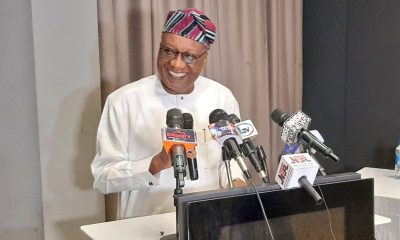
 metro23 hours ago
metro23 hours agoINEC names Sam Olumekun as acting chairman
-

 Education18 hours ago
Education18 hours agoEasiest way to pass UTME, by JAMB registrar Oloyede
-
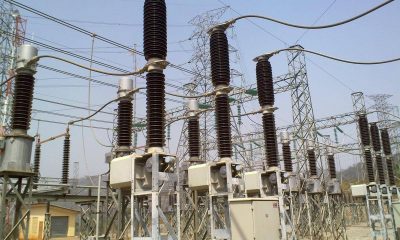
 metro3 days ago
metro3 days agoNational grid: FG officially splits TCN, inaugurates NISO
-

 News3 days ago
News3 days agoAli Baba spills what Obasanjo told him on how to become Nigeria’s President
-

 Sports2 days ago
Sports2 days agoChampions League: Arsenal stun Real Madrid 3-0 as Rice delivers free-kick masterclass





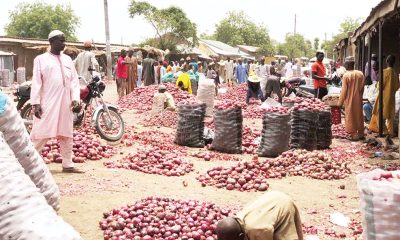

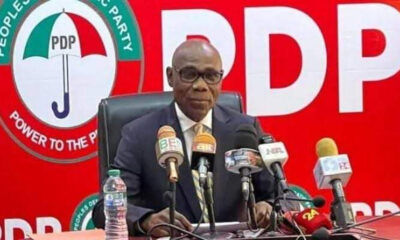




You must be logged in to post a comment Login